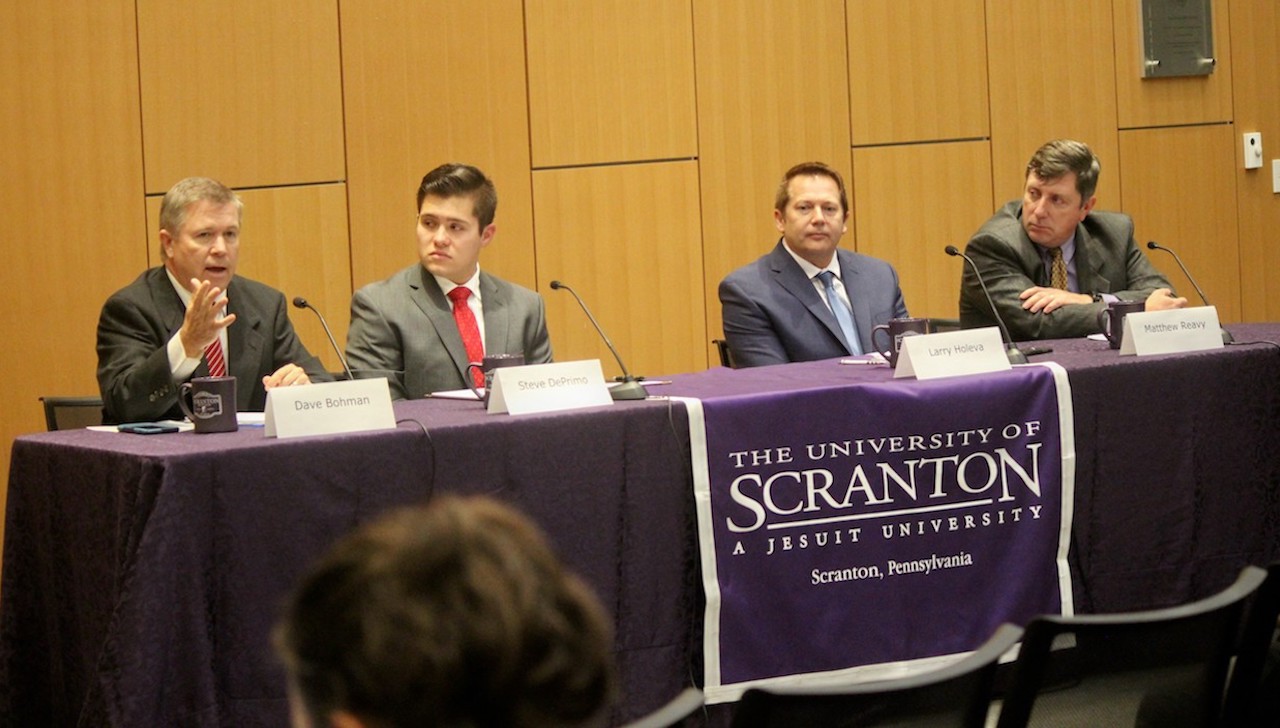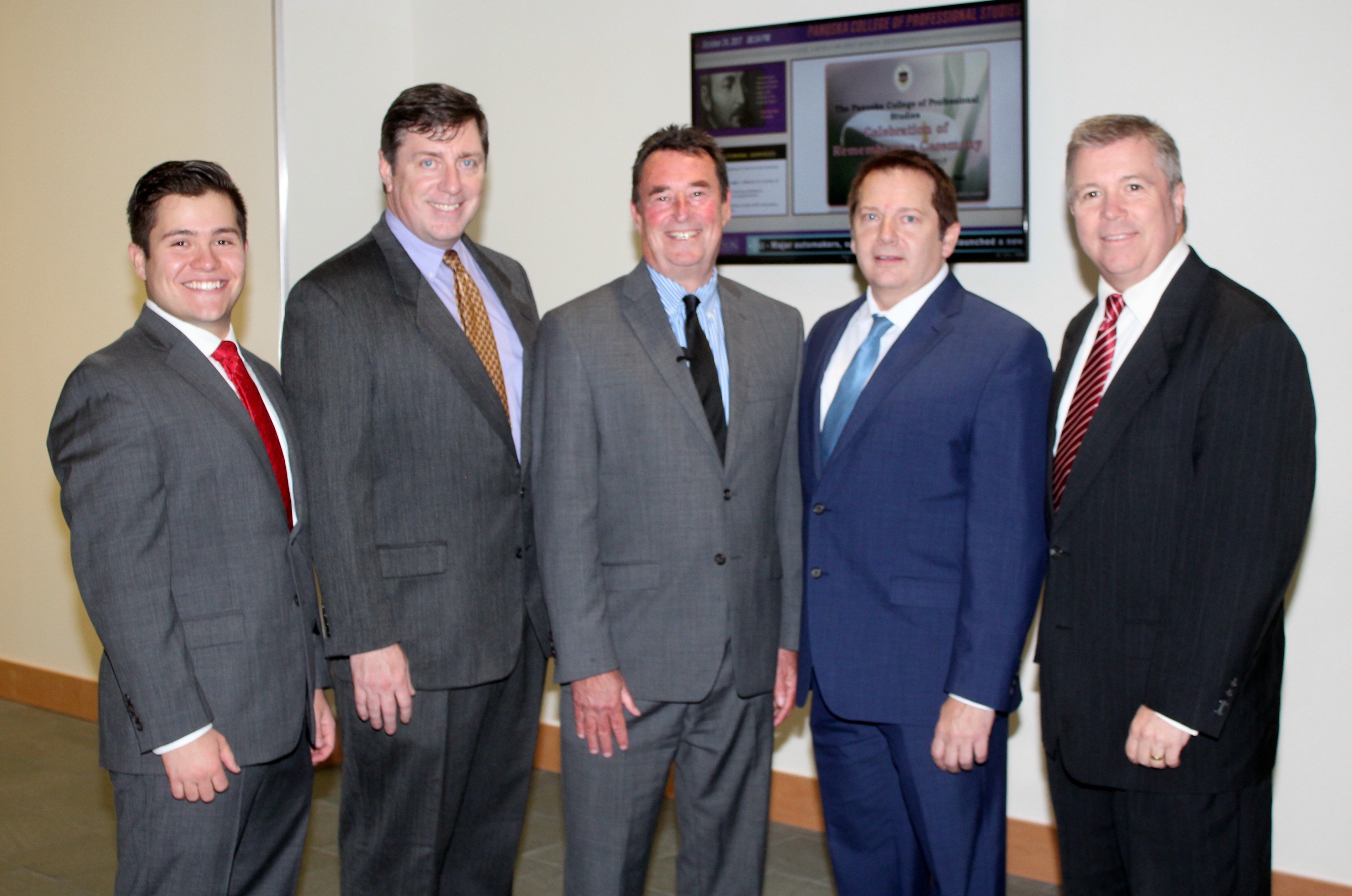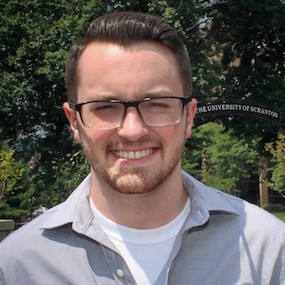Addressing Trust in Today’s News Media

The University of Scranton hosted a discussion about “Trust, Credibility and the News” led by professional journalists and student and faculty representatives of the University’s Department of Communication.
Panelists who participated in the event, which was held in the Forum of Leahy Hall in late October, were Larry Holeva, executive editor of The Times-Tribune, Citizens’ Voice and Standard Speaker; Dave Bohman, investigative reporter at WNEP-TV; Matthew Reavy, Ph.D., associate professor of communication at the University; and Steven DePrimo, managing editor of The Aquinas. Mark Cohen, president of the Pennsylvania NewsMedia Association, moderated the discussion.
The discussion began by highlighting current challenges faced by the news media, including the transition of print sources into an online format. In the spring semester of 2017, The Aquinas changed from print to fully digital format.
“Social media is one of the most successful tools toward driving people to a website,” DePrimo said. “We started a new position this year called social media manager and they are in charge of all social media under the name Scranton Aquinas.”
Panelists also addressed the issue of news credibility.
“We make sure the information we provide goes through a real set of checks and balances,” Holeva said. “It’s really important that you make decisions based on information that has been vetted, that is accurate, that has been challenged, been pushed through an editing process and is not coming out of someone’s opinion.”
Bohman said WNEP-TV has a rigid scripting process.
“There have been some stories that never made air because one of the two people that do our script approval process in a major story will look at it and say that’s not good enough,” Bohman said.
When incorrect information is presented by a journalist, Bohman said was important to inform the public immediately of the error.
“People will respect you more when you make a mistake and you own it as soon as possible,” Bohman said.
“The two things everybody should be doing is accountability, which means stand up for what you’ve done, and transparency, which means show what you’ve done and ideally show why you’ve done something,” Dr. Reavy said. “If you have to make a tough ethical decision that you know a lot of your readers will disagree with, you should be transparent and say here’s why we made the choices that we made.”
Dr. Reavy discussed news media bias at the national level.
“On social issues you definitely see a left bias, whether it’s abortion, affirmative action, same-sex marriage, immigration or trans-gender issues right down the line journalists are going to be much more likely to be on the left side of those issues,” Dr. Reavy said. “On other issues, for example capitalism, journalists are going to have a right wing bias. They’re going to be pro-business because they work for corporations that have to make money.”
Dr. Reavy said the current political situation, with news focused on Republicans in control of the government, is not helping the media improve the public’s perception of their credibility.
“If only we had a Democrat as president that we could really investigate right now that would be great for media credibility,” Dr. Reavy said.
The discussion ended with panelists describing the passion they have for their profession.
“I love being out in the community, speaking with as many people as I can, digging through old files for number that may cause me to question my sources,” DePrimo said. “That’s what gets me up in the morning, gets me through my classes during the day and what puts me in the office until 2 a.m.”
The discussion was sponsored by the Pennsylvania NewsMedia Association, The Times-Tribune, and the Department of Communication at the University.
In poll after poll, “trust” and “confidence” in the news media hovers below 50 percent. The University of Scranton hosted a discussion about “Trust, Credibility and the News” led by professional journalists and student and faculty representatives of the University’s Department of Communication.
The Pennsylvania News Media Association, The Times-Tribune and the Department of Communication sponsored a panel discussion about “Trust, Credibility and the News,” which took place in the Kane Forum of Leahy Hall in October. From left: panelists Steven DePrimo, Waldwick, New Jersey, a senior journalism and electronic media major at Scranton and managing editor of the University’s student newspaper The Aquinas; and Matthew Reavy, Ph.D., associate professor of communication at the University; panel moderator Mark Cohen, president of the Pennsylvania News Media Association, the Pennsylvania News Media Association Foundation and MANSI Media; and panelists Larry Holeva, executive editor of The Times-Tribune, Citizens’ Voice and Standard-Speaker; and Dave Bohman, investigative reporter at WNEP-TV.








